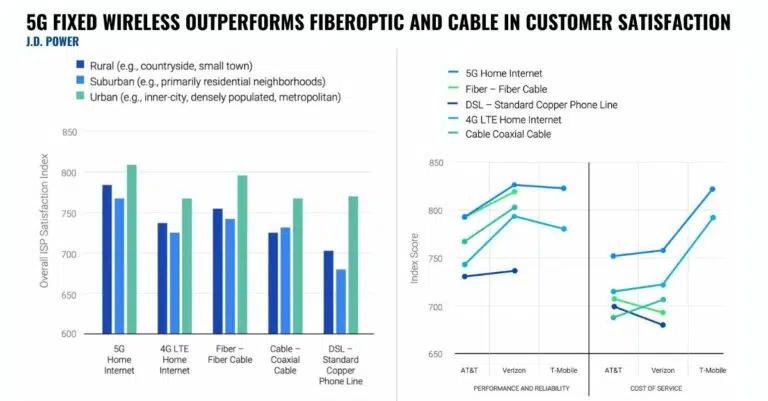
By Hema Kadia, TeckNexus Last Updated: April 24, 2024
Collected at : https://tecknexus.com/5gnews-all/5g-fixed-wireless-outperforms-fiberoptic-and-cable-in-customer-satisfaction/
As the demand for reliable, high-speed internet at home continues to climb, mobile carriers are stepping up their marketing efforts to highlight Fixed Wireless Access (FWA), leveraging the capabilities of 5G and 4G LTE technologies. This innovative approach provides internet service by using the existing infrastructures of Mobile Network Operators (MNOs), presenting a robust alternative to traditional wired connections such as fiberoptic.
Advancements in 5G Enhance FWA’s Appeal
The evolution of 5G technology has been a game-changer for FWA, enhancing its ability to deliver higher data rates, significantly reduced latency, and improved overall reliability. This progress enables 5G-based FWA to compete effectively with, and often exceed, the performance of traditional wired services like fiberoptic, particularly in terms of delivering high-speed internet services to diverse residential environments.
Customer Satisfaction: FWA vs. Fiberoptic and Cable
Recent studies, including those conducted by J.D. Power, show that FWA, especially versions powered by 5G, leads in customer satisfaction scores compared to fiberoptic and cable internet services. This is evident in various customer experience metrics, where 5G FWA users report greater satisfaction irrespective of their location or the complexity of their internet needs.
The Comparative Edge of FWA
Speed and Reliability: Although fiberoptic and cable internet services have made significant advancements in speed, they still lag behind the capabilities of 5G FWA. The latter not only matches but often surpasses these traditional technologies in speed tests and reliability assessments.
Customer Satisfaction Metrics: In detailed evaluations, 5G FWA consistently outperforms fiberoptic by over 20 points on a 1,000-point satisfaction scale. This is a significant margin, highlighting the superior user experience delivered by FWA technologies.
Cost Considerations in Choosing Internet Services
Another critical aspect where FWA gains an edge is in the affordability of the service. With the ongoing economic challenges such as a persistent inflation rate hovering around 3%, cost-effectiveness becomes increasingly important for consumers. Here, 5G FWA stands out by offering comparable performance and reliability at significantly lower costs than its wired counterparts, leading by more than 60 points in cost-of-service comparisons.
Broadening Opportunities for Service Providers
The introduction of FWA is proving to be a catalyst for change in the broadband industry, allowing traditional and new service providers alike to expand into untapped markets. This expansion is facilitating a broader spectrum of choices for consumers, who benefit from the competitive dynamics in terms of pricing and service quality. Notable industry players like T-Mobile are leveraging FWA to offer economical alternatives that attract cost-conscious consumers without sacrificing service quality or network efficiency.
The Future Landscape of Internet Connectivity
With its growing popularity and proven performance advantages, FWA is poised to reshape the broadband service industry. Its role is expected to expand, particularly as more consumers and businesses recognize its benefits in terms of both performance and cost. The continued evolution of 5G technology will likely further enhance the capabilities and appeal of FWA, suggesting a bright future for this flexible and efficient mode of internet connectivity.
For Further Details
This analysis leverages data from the 2023 U.S. Residential Internet Service Provider Satisfaction Study by J.D. Power, which includes feedback from 23,623 internet service consumers and was conducted from October 2022 through August 2023. For more detailed information or to connect with Carl Lepper, Senior Director at J.D. Power overseeing this research.
In summary, FWA is rapidly becoming the preferred choice for high-speed internet across the U.S., driven by its superior performance, reliability, and cost-effectiveness. As this technology continues to advance, its impact on the telecommunications industry is expected to grow, offering exciting prospects for both providers and consumers.

Leave a Reply